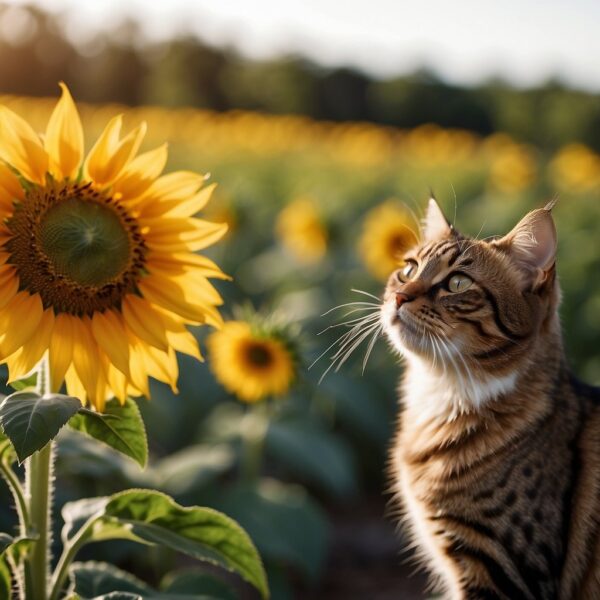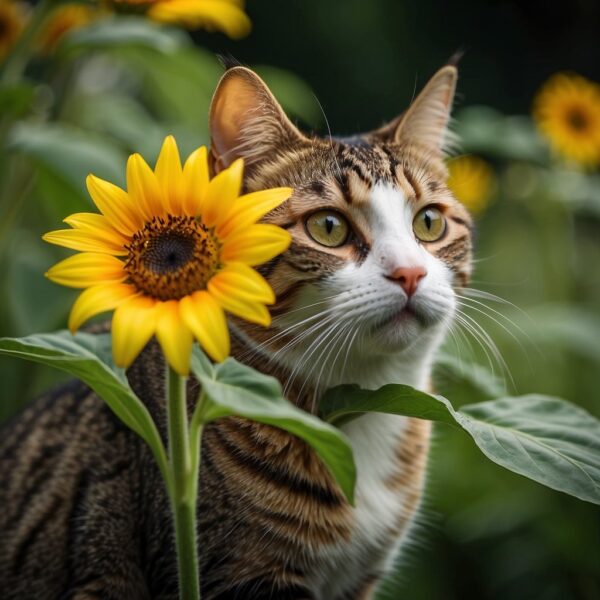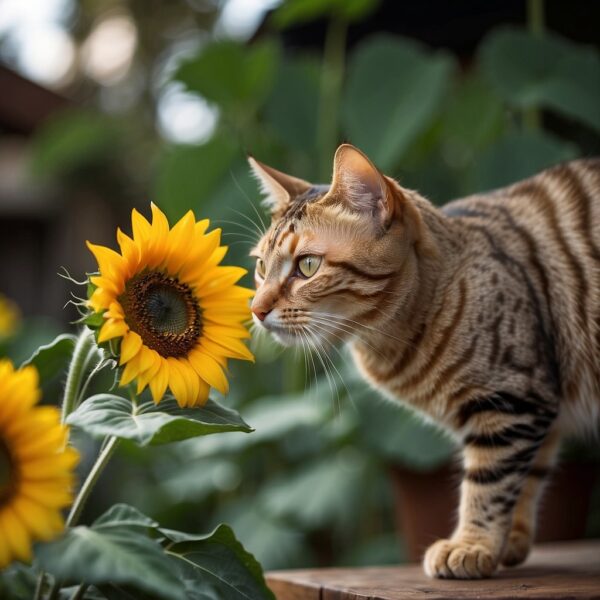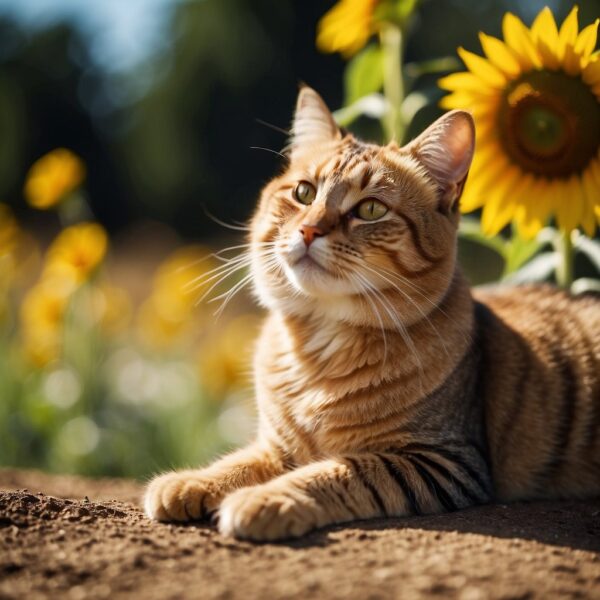
Sunflowers Are Safe for Cat
Cat parents often worry about the safety of their cats when it comes to the plants they have in and around their home. Cats, known for their curiosity and tendency to nibble on greenery, can be particularly at risk if they ingest something harmful. It’s important for cat parents to know which plants are safe for their feline friends and which can cause health issues. Are sunflowers safe for cats?
Sunflowers, with their bright yellow blooms, are a popular choice for gardeners and those who want to bring a bit of sunshine into their homes. Fortunately for cat parents, sunflowers are generally considered non-toxic to cats. While they are safe for cats, it’s advisable to monitor your cats around sunflowers to ensure they don’t eat large parts of the plant, as this can potentially lead to mild digestive upset.
Key Takeaways
- Sunflowers are not toxic to cats and are safe to have in homes with felines.
- Monitoring cats around sunflowers is advisable to prevent possible digestive issues.
- It’s important for cat owners to research plant toxicity to ensure their pets’ safety.
Sunflowers are Safe for Cats under supervision
When discussing the safety of sunflowers for cats, it’s important to understand that sunflowers, generally, are non-toxic to cats. They may enjoy the occasional nibble without serious risk of poisoning. However, certain aspects of sunflowers can pose risks which we will explore in detail.
Sunflower Varieties and Toxicity
Sunflowers, known scientifically as Helianthus, display a wide range of varieties. Despite this diversity, no sunflower variety is listed as toxic to cats. This indicates that the common sunflower and its decorative counterparts are safe for cats in terms of toxicity. The leaves, petals, and stems of the sunflower plant are all considered safe to cats.
Risk Factors of Sunflowers to Cats
Although sunflowers are not poisonous, there are risk factors to consider when cats interact with these plants:
- Digestive Issues: Cats may face mild digestive upset if they consume large parts of the sunflower, like leaves or stems. This can include symptoms such as vomiting or diarrhea.
- Pesticides/Chemicals: If sunflowers are treated with pesticides or other chemicals, ingestion of these substances can be harmful to cats.
In conclusion, while sunflowers themselves are safe for cats, guardians should oversee their cats’ interactions with the plants to prevent any possible digestive issues or contact with harmful substances.

Understanding Plant Toxicity in Cats
When exploring the topic of plant toxicity in cats, it’s critical to recognize the plants that pose a threat, understand the symptoms of toxicity, and be aware of resources like the ASPCA for identifying toxic substances.
Common Toxic Plants for Cats
Cats, being natural carnivores, may inadvertently ingest plants that are toxic to them. Some common hazardous plants that could affect a cat’s health include:
- Lilies: Highly toxic, can cause kidney failure.
- Tulips: The bulbs are particularly toxic to cats.
- Azalea: Even a few leaves can cause vomiting and diarrhea.
- Oleander: All parts are toxic, severe poisoning can occur.
- Sago Palm: The seeds contain cycasin, which can cause liver failure.
- Lily of the Valley: Contains cardiac glycosides, dangerous for the heart.
Other plants such as daffodils, asters, freesia, and stock may also pose a risk.
Recognizing Plant Toxicity Symptoms
The symptoms of plant toxicity in cats can range from mild to severe. Key symptoms to watch out for include:
- Vomiting and Diarrhea: Common initial symptoms of toxicity.
- Drooling: May be a sign of nausea or oral irritation.
- Lethargy: Indicates a decrease in energy, possibly from ingestion of a toxic substance.
- Difficulty Breathing: A severe reaction which could indicate anaphylaxis or other serious toxicity.

Safe Interaction between cats and Sunflowers
When considering the inclusion of sunflowers in a home with cats, it is crucial to manage the exposure of the cats to different parts of the sunflower and to be aware of safer floral alternatives.
Managing Exposure to Sunflower Parts
Sunflowers themselves (Helianthus spp.) are not toxic to cats, which means they can be a cheerful addition to a home without posing a significant risk. However, certain precautions should be taken:
- Petals: While sunflower petals are not harmful, ingestion can sometimes lead to mild digestive upset in cats.
- Seeds: Sunflower seeds are typically non-toxic, but they should be unsalted and shelled. Overconsumption can lead to gastrointestinal issues or potential choking hazards.
- Stem and Leaves: Although not toxic, these parts can be rough on a cat’s digestive system if ingested in large quantities.
- Sunflower Oil: In moderation, sunflower oil is not hazardous to cats and can be found in some pet foods.
For safe interactions, it is advised to:
- Monitor your cat around sunflowers, especially if they show interest in nibbling on the plants.
- Keep bouquets out of reach, ensuring that fallen petals or leaves aren’t ingested by curious kitties.
- Clean up any loose seeds from decorative displays to prevent accidental ingestion.
Alternatives to Sunflowers
Owners who prefer to err on the side of caution have the option of exploring cat-safe plants that pose no risk at all to feline health. Some safe flowers and cat-friendly alternatives include:
- Roses (Rosa spp.): Completely non-toxic to cats and available in many varieties.
- Snapdragons (Antirrhinum majus): A safe, intriguing option for cats who like to bat at interesting shapes.
- Orchids (Orchidaceae family): Elegant and safe, though sensitive to feline interference.
Here is a list of cat-safe plants to consider as alternatives:
| Safe Flowers | Considerations |
|---|---|
| Roses (Rosa spp.) | Non-toxic, widely available |
| Snapdragons (Antirrhinum majus) | Safe, unique flower structure |
| Orchids (Orchidaceae family) | Safe, may require protection from cats |
By selecting cat-safe plants or ensuring careful exposure to sunflowers, cat parents can maintain a harmonious and visually appealing environment that considers their cat’s well-being.
Nutritional Aspects of Sunflowers for Cats
Sunflowers, specifically their seeds and oil, contain nutritional elements that may affect a cat’s health. Understanding the benefits of sunflower oil and the potential hazards of sunflower seeds is essential for cat parents.
Benefits of Sunflower Oil
Sunflower oil, extracted from the seeds of sunflowers, is rich in omega-6 fatty acids. These fatty acids are beneficial for a cat’s skin and coat health. A moderate amount of sunflower oil could potentially be part of a healthy diet, offering a sheen to the fur and potentially aiding in maintaining healthy skin. It is important to note that any addition of oil to a cat’s diet should be discussed with a veterinarian and provided in appropriate, small quantities.
Hazards of Sunflower Seeds
Though sunflower seeds are safe for cats, they do present several health concerns:
- Calories and Weight Gain: Sunflower seeds are high in calories, which can contribute to weight gain if fed to a cat in large quantities.
- Digestive Problems: The fiber in sunflower seeds may cause digestive upset in cats. Shelled or unshelled, seeds can be difficult to digest and may lead to gastrointestinal discomfort.
- Salt and Seasoning: Often, sunflower seeds are sold salted or seasoned. Intake of salted or seasoned seeds can lead to salt toxicity, which can be harmful to a cat’s health.
- Texture and Flavor: The texture and flavor of sunflower seeds might be appealing to some cats, but they offer no nutritional benefit that cats cannot receive from their regular, balanced diet. Cooked, seasoned, or prepared sunflower seeds should be avoided due to the additives and cooking oils that can be harmful to cats.
In summary, while sunflower oil can provide some benefits to a cat’s fur and skin when used judiciously, sunflower seeds may lead to health issues such as weight gain and digestive problems. Cat parents should avoid giving their pets seasoned or salted seeds and consult with a veterinarian before making any significant changes to their cat’s diet.

Preventing Digestive Issues in Cats
To ensure the health and well-being of cats, it is crucial to identify and mitigate common causes of digestive problems. A proper diet and awareness of hazardous items can prevent many digestive issues.
Common Culprits of Digestive Problems in Cats
Nibbling on Certain Plants: Cats may experience digestive upset when they ingest plants that are not compatible with their digestive system. For instance, while not toxic, sunflowers can cause mild digestive upset if a cat nibbles on them excessively.
Inadequate Diet: Feeding cats a diet lacking in essential nutrients can lead to digestive issues. Cats thrive on high-quality commercial cat food formulated to meet their nutritional needs, which includes a balance of proteins, fats, and carbohydrates.
Choking Hazards: Cats can choke on objects that are not part of their normal diet. It’s essential to keep small items that could become choking hazards away from them.
Table Scraps and Human Food: Certain human foods can cause digestive upset in cats. Foods that are high in fat or contain toxic ingredients, such as onions or chocolate, should be avoided to maintain digestive health.
Gerbera and Other Toxic Plants: Apart from sunflowers, other plants like gerbera can be toxic to cats, causing more severe health issues. Limiting access to potentially dangerous plants is a preventive measure.
Preventative Measures:
- Ensure the cat has access only to plants that are safe for them.
- Always provide a balanced diet through high-quality cat food.
- Keep choking hazards and unsafe foods out of reach.
- Understand and monitor the unique dietary needs of your cat.
Keeping Your Cat Safe: Maintaining a safe environment and providing the right diet are the pillars of preventing digestive problems in cats. Regular veterinary checkups contribute to early detection and treatment of any digestive issues.
Safe Houseplant Recommendations
For those who seek to beautify their indoor spaces while keeping them safe for pets, selecting houseplants that pose no threat to cats is essential. Notable amongst the safe selections are certain species of palms and ferns offering lush greenery without endangering curious cats.
- Safe Houseplant Examples:
- Boston Fern (Nephrolepis exaltata)
- Areca Palm (Dypsis lutescens)
- Spider Plant (Chlorophytum comosum)
- Moth Orchid (Phalaenopsis species)
Parents of both cats and dogs should cross-reference lists as some plants may be safe for one species but not the other. Regularly consulting with the ASPCA or a vet for the most current information on non-toxic plants can help to maintain a pet-safe environment.

Cats and SUnflowers: Frequently Asked Questions
Cats are curious by nature, often coming into contact with various houseplants and garden vegetation. It is crucial to understand what flora is safe for them and how to recognize any concerning reactions to potentially harmful plant ingestion.
What plants are non-toxic to cats if they ingest them?
Non-toxic plants to cats include the spider plant, Boston fern, and bamboo palm. The American Society for the Prevention of Cruelty to Animals provides a comprehensive list for reference.
Which flowers can cats safely interact with in a domestic setting?
Flowers such as roses, asters, and marigolds are considered safe for cats. These flowers can be kept in the home without posing a significant risk if a cat chews on them.
What are the symptoms of plant toxicity in cats?
Symptoms of plant toxicity in cats can include vomiting, diarrhea, drooling, lethargy, and abnormal heart rate. Immediate veterinary attention is advised if these symptoms occur.
Can cats experience health issues from eating sunflowers?
Sunflowers are safe for to cats. However, ingestion of large parts of the plant might lead to an upset stomach or blockage, which typically are not severe issues.
How can I ensure my garden is safe for my cat to roam?
To make a garden safe for felines, avoid planting toxic plants, such as lilies or tulips, and use non-toxic alternatives. Regularly check for any plants that might have grown naturally but are unsafe for cats.
What precautions should be taken when introducing house plants to a cat-friendly home?
When introducing house plants into a home with cats, ensure the plants are non-toxic. Keep them out of reach if possible, and consider providing cat-friendly grass or plants to deter them from nibbling on other houseplants.